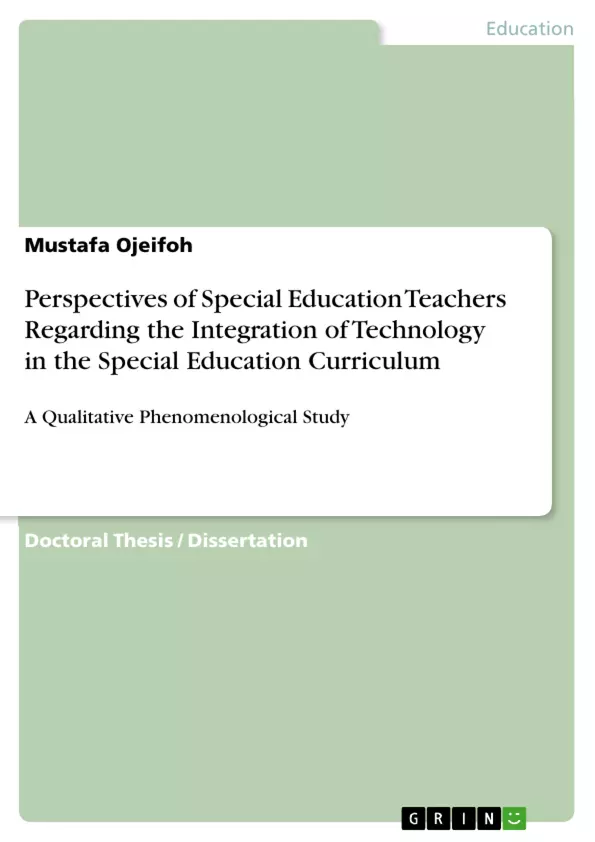The problem addressed by this study was the perspectives of special education teachers regarding integrating technology into the special education curriculum. The purpose of this qualitative study was to discover what lived experiences in school districts special education teachers have on integrating technology into the special education curriculum. Students with learning disabilities are a growing population across many school districts. As a result, the need for support services such as integrating computers into the curriculum to increase students’ academic performance is paramount. The theoretical framework of this study was based on Vygotsky’s constructivism theory to understand human experiences through a phenomenon. The constructivism theory allows teachers to help students build their knowledge while integrating technology into the curriculum. This study used a semi-structured questionnaire and a 30-45 minutes time frame. The sample of twelve special education teachers from one county on the east coast completed an online questionnaire to share their experiences.
Inhaltsverzeichnis (Table of Contents)
- Section 1: Foundation
- Statement of the Problem
- Purpose of the Study
- Research Questions
- Theoretical Framework
- Definitions of Key Terms
- Review of the Literature
- Ethical Assurances
- Section 2: Methodology and Design
- Design and Method
- Population and Sample
- Instrumentation
- Study Procedures
- Data Collection and Analysis
- Assumptions
- Limitations
- Delimitations
- Summary
- Section 3: Findings, Implications, and Recommendations
- Trustworthiness of the Data
- Demographics
- Results
- Evaluation of Outcomes
- Recommendations for Practice
- Recommendations for Future Research
Zielsetzung und Themenschwerpunkte (Objectives and Key Themes)
This qualitative phenomenological study aimed to explore the perspectives of special education teachers regarding the integration of technology into their curricula. The study sought to understand their lived experiences, competencies, and motivations related to technology use in the classroom. This information is crucial for improving educational outcomes for students with learning disabilities.
- Special education teachers' perspectives on technology integration in the classroom.
- Teachers' self-assessed competencies in using educational technology.
- Factors influencing teachers' motivation to adopt technology-based teaching methods.
- Challenges and barriers to effective technology integration in special education.
- The impact of technology integration on student engagement and learning outcomes.
Zusammenfassung der Kapitel (Chapter Summaries)
Section 1: Foundation lays the groundwork for the study, presenting the problem statement, purpose, research questions, theoretical framework (Vygotsky's constructivism), key term definitions, a literature review on technology integration in special education, and ethical considerations.
Section 2: Methodology and Design details the qualitative phenomenological approach, the purposeful sampling of special education teachers (K-5), the instrumentation (open-ended questionnaires), data collection procedures, data analysis methods (thematic analysis using NVivo), and addresses assumptions, limitations, and delimitations of the study.
Section 3: Findings, Implications, and Recommendations (excluding the Conclusions section to avoid spoilers) presents the trustworthiness of the data, demographic information of the participants, and a detailed analysis of the findings related to teachers' perspectives, competencies, and motivations. This section also includes implications of the findings and recommendations for practice, focusing on improving technology integration in special education settings. Specific themes within the findings are explored, such as the positive impact of technology on student engagement and the challenges posed by limited resources and training.
Schlüsselwörter (Keywords)
Special education, technology integration, qualitative research, phenomenology, teacher perspectives, student engagement, differentiated instruction, assistive technology, professional development, resource allocation, Vygotsky's constructivism, learning disabilities, academic performance.
- Citar trabajo
- Mustafa Ojeifoh (Autor), 2023, Perspectives of Special Education Teachers Regarding the Integration of Technology in the Special Education Curriculum, Múnich, GRIN Verlag, https://www.grin.com/document/1514076



